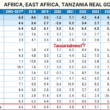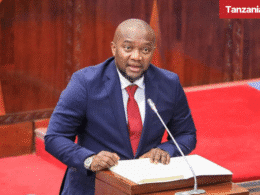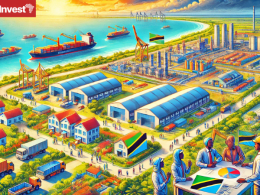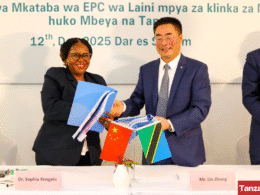Mrs. Christine Kilindu, Executive Director of the Confederation of Tanzania Industries (CTI), makes an analysis of the industrial sector in Tanzania. TANZANIAINVEST interviewed Mrs. Christine Kilindu, Executive Director of the Confederation of Tanzania Industries (CTI), for an analysis of the industrial sector in Tanzania.
TI: It is clear to us that the development of industry in Tanzania is of paramount importance for the economic development of the country and also for generating more added values within the country. What is the current level of industrialization in Tanzania?
Christine Kilindu – Confederation of Tanzania Industries: Unfortunately, industrialization in Tanzania is still young; it’s small and its’ contribution to the GDP has been hovering at just around 8.5%.
This is not a correct situation for a country to be in; we believe that a country must industrialize before it can develop.
There’s a lot of room and opportunity for growth.
TI: What are the main challenges in the industrialization of Tanzania?
CK: The sector is small and it is mainly inward-looking.
Tanzanian manufacturers don’t venture much in exporting; a lot of them look at the local market as sufficient for their operations.
Even though Tanzania is very well-positioned to supply goods to neighboring countries and even though there is investment coming into the manufacturing sector, exports are not as much as we would have wished.
So, one of the challenges for the manufacturing sector in Tanzania is looking beyond its own borders to view the neighboring countries and the world as its own market.
At the Confederation of Tanzania Industries (CTI), we are always calling on our members to be more enterprising, more aggressive, more outward-looking.
But I also appreciate the difficulties the manufacturing sector is going through.
As you know, we are just transitioning from a command economy to a market economy.
In that regard, the culture is still based on the past.
Although there’s a partnership between government and the private sector, we still have remnants of bureaucrats who are scared of making decisions that support private industry.
This is because of the culture of some people to cling on to power; being able to say no makes them the boss.
These people don’t understand that if they facilitate the development of the industry and the industry grows, then they’re facilitating income-generation, job creation, and ultimately, more taxes.
TI: What does the Confederation of Tanzanian Industries do to promote the industrial sector independent of the government?
CK: The Confederation of Tanzanian Industries is the most effective lobby group in the country.
Our role is as a go-between for the government and the private sector, particularly in the manufacturing sector. {xtypo_quote_right}Our role is as a go-between for the government and the private sector, particularly in the manufacturing sector.{/xtypo_quote_right}
We believe that lobbying as a group is more effective than lobbying individually.
So we are the spokespersons and represent our members in dialogues with the government.
We are represented in many task forces, in some boards, and in some committees of the government.
We also encourage our members to grow.
Three years ago, we introduced the President’s Manufacturer of the Year award.
This brings out the best in our members; they compete based on their economic performance, human resources, corporate responsibility, environmental aspects, gender mainstreaming – all those aspects that make a business thick are within the criteria of the President’s Manufacturer of the Year award.
We also encourage our members to upgrade their technology.
We have a page in our newsletter where we inform our members about the new technologies that are emerging.
We also have a page about business matchmaking and export enquiries.
We give all these things to our members as a free service.
TI: Tanzania has the privilege of having duty-free access to the US and to Europe, with AGOA and EBA. However, it seems that Tanzania hasn’t completely taken advantage of these trade facilities. Within such framework, what can foreign direct investors do? What role can they play in the development of the industrial sector?
CK: I feel that the private investment should be targeted towards these industries that would produce goods with access to the duty-free, quota-free markets that we’ve been offered.
Foreign direct investment can help in terms of upgrading our machinery, improving production, bringing in more capital than can be generated locally and increasing output.
We’re looking for investors to come and create new and large establishments that can really take advantage of these facilities.
But unfortunately, whenever we find investors coming to Tanzania, they’re interested in selling their goods here instead of producing for export.
And people are thinking in terms of small scales too.
We’re not really impressed by the size of the investment that comes to the industry; we’re looking for something huge that can make a difference. {xtypo_quote_right}We’re not really impressed by the size of the investment that comes to the industry; we’re looking for something huge that can make a difference.{/xtypo_quote_right}
We produce cotton; can one imagine a country like Tanzania importing cloth?
It shouldn’t be so because we have been exporting barrels of cotton for years.
Forty years down the line, the history is the same.
I would have wished somebody big to come here and say, ‘Now, I’ll process maybe 50 or 60% of all the cotton, here, locally.
Process it to yarn, cloth and proceed to make garment.’
Tanzania Investment Framework
TI: Let’s look at three of the aspects investors in manufacturing, for example, will consider when looking at which country to invest in. Firstly, how conducive and adequate is the legal framework for foreign investments in Tanzania?
CK: The legal framework is changing.
What we found on the ground when the Confederation of Tanzania Industries (CTI) was created was a legal framework that was purely socialist and it was expected to save an emerging capitalist market.
That was a mismatch.
Over the years, however, we’ve had dialogue with the government and there are a lot of reforms that are taking place.
But when one talks to business people, one will see that there are a lot of things that can be done better.
The registration of companies can be faster, the commercial code can also be made faster.
When the commercial code was created, it was good; in three months, a case would be dispensed.
But now it seems to have gone back to business as usual; commercial codes are taking a long time to be litigated.
For a businessperson, that is not right.
The other issue is access to land.
The legality about land is a bit delicate.
Even though the Tanzanian Investment Centre has a land bank (tracks of land available for private sector investment), the legal process before the land can be given is long.
These things are being handled by the government but in a slow manner.
When one talks to someone in the government, they understand your point of view but that seems to be the end; there is no follow through.
That’s why I say there are some remnants of bureaucracy left.
TI: The second aspect investors consider is manpower. When a big industrial group will decide to come to Tanzania, will they have adequate manpower for their operation in this country?
CK: Low-skilled workers are available, although highly-skilled workers, like managers, are an emerging breed.
Our young women and men who are coming out of universities may be the ones that can supply the workforce.
But it’s good for investors to bring in some key people, particularly in the professions that Tanzanians aren’t well-trained.{xtypo_quote_right}It’s good for investors to bring in some key people, particularly in the professions that Tanzanians aren’t well-trained{/xtypo_quote_right}
For example, we don’t have geologists and hotel management is still new to us.
In the electronic banking and electronic communication sector, we’re not there yet.
So manpower is a delicate issue.
People sometimes ask why Europeans or Indians come to work in Tanzania but they need to understand that there is a gap.
This is a challenge for our government to invest in human capital by changing the curriculum, improving the quality of education, and providing quality teachers and facilities.
Human capital development is one of the priorities of the new government but a number of schools that have opened don’t have sufficient teachers.
Yes, the school buildings are coming up but do we have the facilities and the trained teachers?
No we don’t.
Every child who finishes primary school is expected to go to secondary school.
It’s a very noble idea but we don’t have teachers and facilities like laboratory equipment.
The government is trying but we’re not there yet.
TI: The last issue to the enabling environment that investors will focus on is infrastructure. How adequate is the overall infrastructure for an industrial establishment, even though it is different from region to region?
CK: For example, cement is produced in Dar el Salaam by Tanzania Portland Cement.
But if one goes to the lake zone, one won’t find cement at all.
It’s so expensive and difficult to move cement from Dar el Salaam to the north.
It used to be transported by train, when the railway was still working.
But for the last 10 years, the railway has been in shambles.
So the cement has had to be transported by trucks from Dar el Salaam to the northern regions, and that is a very long distance.
Consequently, the prices of cement in the north are not affordable.
So what happens is that cement coming both from Kenya and Mozambique are the ones that are taking our market in the north.
There is an opportunity for a cement factory in the northern region and there is a market there.
Most of the industry in Tanzania is located in Dar el Salaam so transporting goods to the other parts of the region by road is long and expensive.
And there are some areas where there are no roads.
So competitors from small neighboring countries are the ones that are making use of our market.
In addition, there is a problem with rural roads.
{xtypo_quote_right}The government has been addressing trunk roads but there is also a need to develop rural roads so that the agriculture produced from the rural areas can be transported to the cities for processing and the manufactured goods from the cities can reach the villages.{/xtypo_quote_right}
Most of them can’t be used during the rainy season.
The government has been addressing trunk roads but there is also a need to develop rural roads so that the agriculture produced from the rural areas can be transported to the cities for processing and the manufactured goods from the cities can reach the villages.
The other issue with regards to infrastructure is electricity.
We have had four droughts and each time there was load-shedding, same as last year.
When the load-shedding ended, it was realized that the infrastructure itself was very poor and whatever energy is there isn’t of consistent quality.
There’ll be outages with voltages fluctuating high and low.
These have had damaging effects on the members because they’re so sensitive to the quality of power that if it goes too high or too low, they will incur damages and losses.
People from Tanga cement have had a big loss in equipment because of these fluctuating voltages.
We are grateful that, finally, Tanzania Electric Supply Company (TANESCO) was able to access a commercial loan for improving the energy infrastructure.
But the worrying thing is that they’re talking about increasing the tariffs by about 40%, which we think is extremely high, and we don’t think industries can absorb that increase in one go.
Tanzania Investment Opportunities
TI: From everything that you’ve said, it seems that you have lots of opportunities, again thanks to your geographical location, to the natural resources of your country, and the privileged access to other markets. Why do you believe that investing for industrial development in Tanzania would be worthwhile to foreign investors?
CK: We have our own challenges but the government is not sitting down folding its’ arms.
It’s listening and making changes where necessary.
They’re slow but the changes are coming.
Tanzania today isn’t what it was 15 years ago.
When the Confederation of Tanzania Industries was founded in the early 1990s, we didn’t have access to any minister or any middle-level bureaucrat.
There was mutual distrust between the government and the private sector.
There was a gap.
We weren’t talking to each other and we weren’t talking in the same language.
But today, we sit on the same table and there is an understanding that we are together in the drive to develop the economy.
It’s the private sector that provides the taxes and the government appreciates that.
In the revenue authority, they even have a list of taxpayers whom they call large taxpayers, and they have their own desks and offices.
Now, the government is even considering selecting some taxpayers whose goods won’t even be inspected at the port.
They appreciate the business community and know that is doing a good job.
What gives me more hope is that the government itself isn’t sitting down but is asking the investors to come.{xtypo_quote_right}What gives me more hope is that the government itself isn’t sitting down but is asking the investors to come.{/xtypo_quote_right}
And the government understands that the investors that we’re inviting have choices: they can go to the Eastern European countries, or they can go to Mozambique nearby, so this is a call for our own government to do better.
Right now, we’re talking about Tanzania’s access to the Millennium Challenge Account.
It’s geared towards improving roads, energy, irrigation and those are some of the things the country needs in order to make it an even better investment destination for foreign investors.
Another thing is that the population is suddenly being educated.
When you go out to the villages today, you’ll find people with shoes on their feet, where years ago there were no shoes in the villages.
So people are working hard to be able to access what is good for them.
They’re looking at educating their children and an educated society is a buying society, a society that can use the products produced in Tanzania.
I think we’re on a growth path.
I have a lot of hopes for Tanzania.
Our own industries appreciate that there are a lot of choices from Chinese goods to Pakistani goods.
So, slowly they’re also improving their own products.
In the past, importation to Tanzania was impossible because we were a closed economy.
TI: What are some of the interesting subsectors of industry in Tanzania that foreign investors should look at?
CK: I think foreign investors should look at the apparel industry, from textiles up to the processing of garments.
The population is growing and becoming better; per capita income is slowly improving.
Investors can consider the garment industry, both for the local and the export market.
The US, Europe and Canada have all given us preferential treatment.
They can also be looking at the fruit and vegetable canning and processing industry.
It’s sad to see that during the harvest season, there are many trees that fall, still with fruits.
And during the dry season, there are no fruits because more than 40% of the fruits have just rotted and there is no cold storage.
If one goes to Iringa and sees the tomatoes, one would just want to cry.
We need canning of the tomatoes, and processing of tomatoes into ketchup and various sauces.
It’s sad to go to the supermarkets and look at the goods Tanzania imports.
I’m not against importation but I think basic things should be produced within the country.
The other thing that the Confederation of Tanzania Industries does is we have a promotion we do from time to time.
‘Buy Tanzanian, Build Tanzania’.
We’re saying, let’s have a culture of preference for whatever Tanzania can produce.
The other area that investors should look at is the leather industry. We are number three in Africa for the largest population of livestock.
But we don’t have a leather industry worth mentioning.
All we do is sell the raw hide and skin to Italy, where they get processed for shoes, and then the shoes come back here to be sold.
In my opinion, the textile industry, agro-business and agro-processing, as well as hides and skins are interesting subsectors for investment within industry.{xtypo_quote_right}In my opinion, the textile industry, agro-business and agro-processing, as well as hides and skins are interesting subsectors for investment within industry.{/xtypo_quote_right}
In other sectors, there is a need for more hotels and more banks.
TI: What would be your piece of advice to foreign investors looking at coming to Tanzania? What is it that you’d like to make sure they understand about Tanzania?
CK: What they need to understand about Tanzania is that it is an emerging economy and that we are set to improve our ways and attract foreign investors.
People in Tanzania are realizing that it is their own effort that can make them grow so they’re eager to partner with foreign investors provided that the terms and conditions are understood.
They must be very careful with selecting their partners.
They should select partners with track records not just everybody who comes form from the street.
But when investors come here, we have the Tanzanian Investment Center, which is very investor-friendly.
We have the chamber of commerce that can take them around, we have the Confederation of Tanzania Industries, a very effective lobby group, and we welcome foreign investors who choose to set up their businesses in Tanzania.
They can become our members and we’ll hold their hands in the initial stages of applying for their licenses, looking for places where they can set up shops, just making them comfortable.










